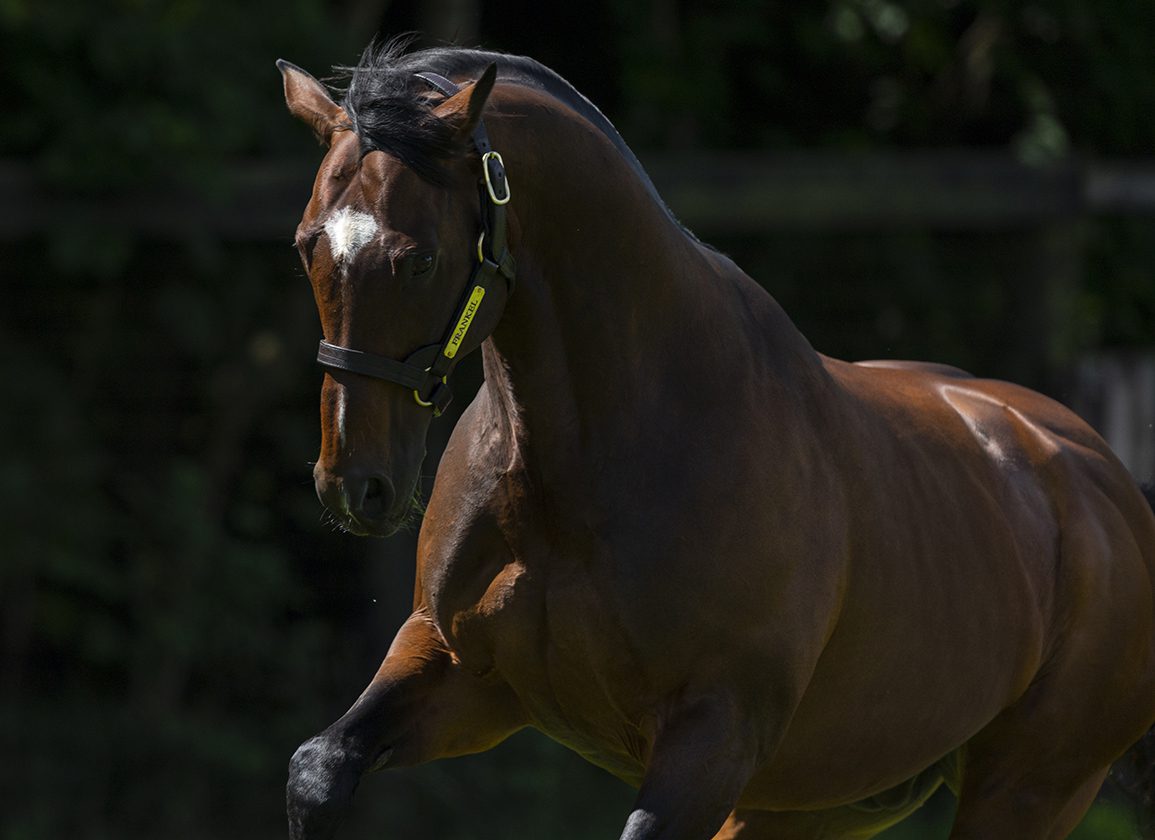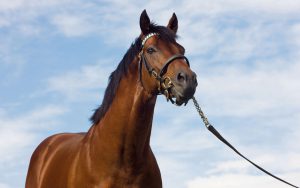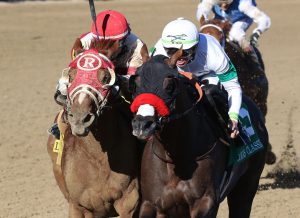By Chris McGrath
Well, that was one even I managed to see coming. With sterling bleeding at the bottom of the stairs, the most expensive yearling transaction of 2022 was duly enacted at Tattersalls this week.
It was always going to be a wild market: Keeneland had shown the big spenders to remain impervious to war and inflation, while the local currency had been set aflame after new leaders sent home the babysitter and started playing with fiscal matches.
Sure enough, Book I catapulted to giddy new heights, recording surges of 45 percent in turnover; 30 percent in average; and 25 percent in median. But once you incorporate a 20 percent haemorrhage in the value of a guinea since this time last year, those gains largely maintain the kind of bull run that has continued unabated in the U.S. (where aggregate yearling trade is up 14.8 percent).
This auction did, however, have two additional drivers. One is Frankel (GB), who accounted for the top four prices and is reaching a status in his second career parallel to that he achieved in his first. The other was an extraordinary renewal of ardor, notably for the sale's other dominant stallion, in the man who has long sustained this industry through good times and bad.
Sheikh Mohammed's Godolphin team was again conspicuous by its absence in Lexington last month, having topped the September spending as recently as 2019 at $16 million. At Tattersalls this week, however, Godolphin bought 35 yearlings for 25,355,000gns, up from 15 for 9,375,000gns last year. Astonishingly, that weighed in at 20 percent of the gross!
In the American yearling market, the defection of an investor with apparently bottomless resources has actually stimulated domestic competition. Whether similar sustainability might be discovered in any such vacuum in Europe is hard to know. Without the Maktoums, breeders there might well find themselves precariously reliant on an export market that will, logically, eventually destroy its own value. For now, the racing product owes much of its competitive validation to sheer heritage. But that cannot continue if a) an increasing portion of the talent pool is exported even before it gets to the track, and b) successor investors don't match the Maktoums' long toleration of inadequate purses.
As it is, the Sheikh appears to have been especially animated by the finite opportunities left to Dubawi (Ire). The stallion he cherishes for redeeming the tragedy of Dubai Millennium (GB) is now 20, and his owner bought as many as 14 of his 21 yearlings sold this week. But even those with no such sentimental spur appeared so devoted to a tiny apex of the sire pyramid that it almost seems credulous. Combining a Book I physique with Frankel or Dubawi was treated as a short-cut to no fewer than 21 of the 28 sales for 750,000 guineas and above. If only the game were that simple!
Dubawi | Darley Photo
Frankel, of course, had posted a timely advertisement in Paris on the eve of the sale. Alpinista (GB) is no mere slogger—she was cruising throughout—even though Frankel has quickly established himself, like his own sire, as a profound staying influence; while the dam is by another such in Hernando (Fr).
It just shows how that elusive concept, class, is crucially underpinned by the stamina that allows you to carry your speed. That's a point I'm always making about dirt blood, but sticking to the European theater let's consider another son of Galileo (Ire) now at stud. Australia (GB) is famously out of Ouija Board (GB) whose prowess over a mile and a half will be remembered in the U.S. Yet he was arguably unlucky when only just beaten by Night Of Thunder (GB) and Kingman (GB) over the mile of the G1 2,000 Guineas. Ouija Board's family has mixed flavors but it's hardly the breeding-by-numbers sprint formula by which many people ended up trying to leaven the stamina of Galileo (Ire). Her third dam, indeed, was by a winner of the Ascot Gold Cup (20 furlongs). Yet perhaps Australia's principal stud achievement to date is a GI Breeders' Cup Mile winner.
That horse, Order Of Australia, returns Saturday to the scene of his finest hour for the GI Coolmore Turf Mile. There will doubtless be much comment about the sponsors inviting Christophe Soumillon to ride this horse for the first time, pending the two-month ban he received for a vividly perilous misjudgement in France last week. Though I have heard some disapproval of this apparent indulgence, it strikes me as a magnanimous gesture to a man who has, besides his suspension, lost a lucrative job and much esteem. This is not the first time these owners have provided a first step back up the ladder for someone who has taken a humiliating fall.
It's the deed you punish, not the consequences, and Sonny Leon's exhibition on Rich Strike (Keen Ice) last weekend looked at least as provocative but for the happy detail that his adversary stayed aboard. Instead it was fun to see Tyler Gafflione's hilarity, and Hot Rod Charlie (Oxbow) stifling any ungenerous mutterings about his win ratio.
Both horses showed all the valor and commitment that Calumet so prizes in its stallion roster. Whether that will assist their respective sires in turning the tide remains to be seen, but this is a farm animated by the most edifying priorities even if the execution sometimes shows them to be marching to their own drum.
Rich Strike & Hot Rod Charlie battle it out down the stretch | Coady Photography
Rich Strike notoriously carried the Calumet colors until winning a claimer by 17 lengths last year, and there can be barely less regret over War Like Goddess (English Channel). Both she and her dam were cheaply discarded and nor can her excellence now assist her late sire, who was doing so much to vindicate Calumet's message.
Sold for $1,200 as a weanling, War Like Goddess advanced her value to $30,000 as a 2-year-old when her slow-burning development was identified by Donato Lanni. The agent will have derived much satisfaction from the way she has bloomed since, reiterating the horsemanship that first earned him the kind of clients who can shop right at the other end of the marketplace. Fitting, then, that War Like Goddess was bought for the man who first got Lanni started, 20 years previously, George Krikorian.
Her damsire, North Light (Ire), could well prove the last Epsom Derby winner to stand in Kentucky. When you think of the breed-shaping legacy of so many predecessors, from the inaugural winner Diomed to Blenheim to Roberto, that is a dismal prospect. But you never know, the wheel may turn again someday.
That's the whole beauty of this game: you never know. Perhaps War Like Goddess, in her bid for the GI Joe Hirsch Turf Classic, can remind some of those who have been jumping through Frankel-shaped hoops at Tattersalls why this game is known as a great leveller. Maybe one of the 16 yearlings that made seven figures this week will go on and win the Epsom Derby. But few, if any, will ever run anything like War Like Goddess, who was led out unsold at $1,000 when taking her own turn at a yearling sale. Okay, so we never know. But I reckon that's one thing you know for a fact.
Not a subscriber? Click here to sign up for the daily PDF or alerts.








